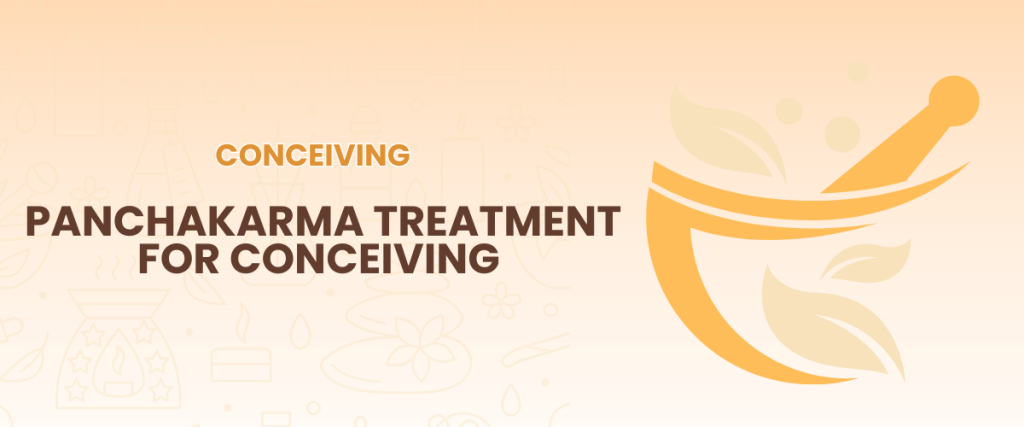
For many couples, the journey to parenthood can be tough. Stress, poor lifestyle habits, hormonal imbalances and underlying health conditions can affect fertility in both men and women. While modern medicine has many solutions, many are turning to Ayurveda for a more holistic and natural approach.
Among Ayurveda’s time-tested methods, panchakarma treatment for conceiving is a powerful way to prepare the body, mind and reproductive system for healthy conception. At Sarvagun Ayurveda, we combine ancient Panchakarma techniques with modern expertise to help couples naturally boost their fertility and increase their chances of getting pregnant.
What is Conceiving?
Conceiving means becoming pregnant when a sperm fertilizes an egg and the fertilized egg implants into the uterus. Sounds simple but it requires a healthy reproductive system, proper hormonal balance and overall wellness in both partners.
Several factors can affect the ability to conceive:
- Hormonal imbalances
- Irregular menstrual cycles
- Poor sperm count or motility
- Stress and anxiety
- Nutritional deficiencies
- Chronic illnesses
Ayurveda views conception not just as a physical event but as a union of a healthy body, balanced mind and harmonious energy.
How does Ayurveda understand Conceiving?
In Ayurveda, conception is explained through the Garbha Sambhava Samagri theory which states that a healthy pregnancy requires four essential elements:
- Rutu (Timing) – The fertile period in a woman’s menstrual cycle.
- Kshetra (Healthy womb and reproductive organs) – A well prepared and toxin free reproductive system.
- Ambu (Proper nutrition) – Adequate nourishment for both partners.
- Beeja (Healthy sperm and ovum) – Strong and balanced reproductive cells.
Ayurveda also emphasizes the balance of Vata, Pitta and Kapha doshas for reproductive health. Any imbalance along with toxin buildup (Ama) can hinder fertility. Panchakarma treatment for conceiving works to detoxify, rejuvenate and restore this balance creating the best possible conditions for conception.
Benefits of Panchakarma for Conceiving
Panchakarma offers many benefits for fertility by addressing both physical and mental aspects. At Sarvagun Ayurveda, our panchakarma treatment for conceiving gives you:
- Detoxification of the reproductive system – Removes deep-seated toxins (Ama) from the body, cleanses the reproductive organs and improves the quality of sperm and ovum for healthy conception.
- Balancing of hormones – Restores natural hormonal rhythms which supports regular ovulation in women and better sperm health in men.
- Improved uterine health – Increases blood circulation and nutrient supply to the uterus, making it more receptive for embryo implantation.
- Stress reduction – Relieves mental and physical stress through calming therapies like Shirodhara, reduces stress related fertility problems.
- Boost in energy and immunity – Strengthens the body’s defense system and boosts energy, ensures better stamina and health during the conception journey.
- Better sperm quality – Enhances sperm count, motility and morphology, improves the chances of successful fertilization.
- Support for recurrent miscarriages – Rejuvenates and strengthens the reproductive system, increases the ability to carry a pregnancy to full term.
The Panchakarma Process for Conceiving
The panchakarma process for fertility is customized based on each couple’s health condition, dosha imbalance and medical history. At Sarvagun Ayurveda, the process includes:
Step 1: Purva Karma (Preparation)
o Gentle oil massages (Snehana) and herbal steam therapy (Swedana) prepares the body for detoxification.
Step 2: Pradhana Karma (Main Detox Therapies)
o Therapies like Virechana (purgation) and Basti (medicated enema) are used to remove toxins and restore dosha balance.
Step 3: Paschat Karma (Post-Care)
o Fertility-boosting diet, herbal medicines and lifestyle guidance for continued reproductive health.
What Are the Techniques Used in Panchakarma to Treat Conceiving?
At Sarvagun Ayurveda, our panchakarma treatment for conceiving may include one or more of these Ayurvedic therapies:
- Uttar Basti – Medicated oil or decoction is inserted into the uterus or bladder to cleanse and nourish reproductive organs.
- Virechana – Herbal purgation to eliminate excess Pitta and toxins affecting hormonal balance.
- Basti Therapy – Medicated enemas to balance Vata dosha, improve pelvic circulation and strengthen reproductive organs.
- Nasya – Herbal oils control through the nasal passage to clear toxins from the head and improve hormonal function.
- Abhyanga (Full Body Oil Massage) – Improves circulation, reduces stress and enhances reproductive health.
- Shirodhara – Warm herbal oil poured continuously over the forehead to calm the nervous system and reduce stress related infertility.
How Does Panchakarma Work for Conceiving?
Panchakarma treatment for conceiving works by:
- Cleansing the toxins that affect reproductive health.
- Balancing the doshas, especially Vata which is the key to conception.
- Healing the uterus, ovaries, sperm and semen.
- Supporting hormonal balance and regular periods.
- Improving nutrient absorption for better reproductive cell quality.
- Reducing mental stress which is often the hidden cause of infertility.
By cleansing and rejuvenating the body at a deep level Panchakarma creates the right physical and emotional environment for getting pregnant.
Conclusion
Infertility can be a stressful and emotional journey but natural solutions like panchakarma for getting pregnant offer hope and healing. By cleansing the body, balancing hormones and rejuvenating the reproductive system, Panchakarma lays a strong foundation for a healthy pregnancy.
At Sarvagun Ayurveda we provide personalized fertility care by combining ancient Ayurvedic wisdom with modern understanding. Our treatments not only focus on getting pregnant but also on the overall health of the mother and baby.
If you are looking for a safe, natural and holistic way to parenthood Panchakarma could be the life changing therapy you need.
FAQs
Time depends on your health condition but most couples see improvement in 1-3 months of treatment.
Yes Panchakarma is highly effective in balancing hormones and improving ovulation in women with PCOS.
Yes it improves sperm count, motility and overall reproductive health in men.
When done by trained Ayurvedic doctors, Panchakarma is safe and side effect free.
We offer personalized Panchakarma therapies to manage your unique fertility challenges using a blend of traditional and modern approaches.

I am an Ayurvedic doctor with over two years of hands-on experience in managing both outpatient (OPD) cases and medical emergencies. My journey in Ayurveda has equipped me to effectively diagnose and treat a wide range of conditions, from chronic kidney disease, liver failure, and cirrhosis to digestive disorders and allergic diseases like asthma, sinusitis, and allergic rhinitis.
I specialize in treating joint disorders, metabolic issues, and various lifestyle-related conditions through a root-cause-based Ayurvedic approach. I focus on personalized care—tailoring treatment plans according to each patient’s constitution, lifestyle, and medical history.
In addition to my expertise in Ayurvedic medicines and therapies like Panchakarma, I also have a sound understanding of allopathic medicine, which helps me integrate modern approaches when needed for better outcomes. In emergency situations, I stay calm under pressure and act quickly to stabilize and support patients.
I’m deeply committed to continuous learning and staying updated with the latest advancements in both Ayurveda and modern medicine. My mission is to support every patient’s journey toward lasting health, vitality, and balance through compassionate, holistic care.

